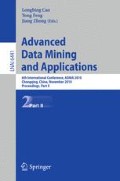Abstract
Bottom-up computation of data cubes is an efficient approach which is adopted and developed by many other cubing algorithms such as H-Cubing, Quotient Cube and Closed Cube, etc. The main cost of bottom-up computation is recursively sorting and partitioning the base table in a worse way where large amount of auxiliary spaces are frequently allocated and released. This paper proposed a new partitioning algorithm, called Double Table Switch (DTS). It sets up two table spaces in the memory at the beginning, where the partitioned results in one table are copied into another table alternatively during the bottom-up computation. Thus DTS avoids the costly space management and achieves the constant memory usage. Further, we improve the DTS algorithm by adjusting the dimension order, etc. The experimental results demonstrate the efficiency of DTS.
Access this chapter
Tax calculation will be finalised at checkout
Purchases are for personal use only
Preview
Unable to display preview. Download preview PDF.
References
Zhao, Y., Deshpande, P., Naughton, J.F.: An Array-Based Algorithm for Simultaneous Multidimensional Aggregates. In: SIGMOD, pp. 159–170 (1997)
Beyer, K., Ramakrishnan, R.: Bottom-Up Computation of Sparse and Iceberg CUBEs. In: SIGMOD, pp. 359–370 (1999)
Han, J.W., Pei, J., Dong, G., Wang, K.: Efficient computation of iceberg cubes with complex measures. In: SIGMOD, pp. 441–448 (2001)
Lakshmanan, L., Pei, J., Han, J.W.: Quotient Cubes: How to Summarize the Semantics of a Data Cube. In: VLDB, pp. 778–789 (2002)
Lakshmanan, L., Pei, J., Zhao, Y.: QCTrees: An Efficient Summary Structure for Semantic OLAP. In: SIGMOD, pp. 64–75 (2003)
Li, S.E., Wang, S.: Research on Closed Data Cube Technology. Journal of Software 15(8), 1165–1171 (2004)
Xin, D., Shao, Z., Han, J.W., Liu, H.: C-Cubing: Efficient Computation of Closed Cubes by Aggregation-Based Checking. In: ICDE (2006)
Xin, D., Han, J.W., Li, X., et al.: Computing Iceberg Cubes by Top-Down and Bottom-Up Integration: The StarCubing Approach. IEEE Trans. Knowl. Data Eng. 19(1), 111–126 (2007)
Author information
Authors and Affiliations
Editor information
Editors and Affiliations
Rights and permissions
Copyright information
© 2010 Springer-Verlag Berlin Heidelberg
About this paper
Cite this paper
You, J., Jia, L., Hu, J., Huang, Q., Xi, J. (2010). Double Table Switch: An Efficient Partitioning Algorithm for Bottom-Up Computation of Data Cubes. In: Cao, L., Zhong, J., Feng, Y. (eds) Advanced Data Mining and Applications. ADMA 2010. Lecture Notes in Computer Science(), vol 6441. Springer, Berlin, Heidelberg. https://doi.org/10.1007/978-3-642-17313-4_19
Download citation
DOI: https://doi.org/10.1007/978-3-642-17313-4_19
Publisher Name: Springer, Berlin, Heidelberg
Print ISBN: 978-3-642-17312-7
Online ISBN: 978-3-642-17313-4
eBook Packages: Computer ScienceComputer Science (R0)

